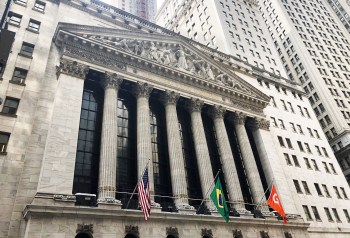Iraq Stock Exchange tries to diversify from oil
Steve Chiotakis: Defense Secretary Leon Panetta and other top military leaders will appear in front of a Senate panel today to answer questions troop withdrawals from Iraq. And as troops leave there, American officials hope the free market will take hold.
Lionel Johnson is with the U.S. Chamber of Commerce, which is hosting the leaders of the
Iraq Stock Exchange today in Washington. Lionel Johnson, good morning.
Lionel Johnson: Good morning, how are you?
Chiotakis: I’m well. I know Iraq’s economy has long been dominated by oil — as are most other countries in the Middle East. Is that changing?
Johnson: It’s changing. International investors — both American and other internationals — are taking a very close look at the transition to a market economy in the country. And the importance of the non-oil, and even non-energy sector, for the country’s long-term stability.
Chiotakis: What’s the biggest change in the Iraqi economy since the fall of Saddam Hussein?
Johnson: I think the biggest change is the degree to which there is an appreciation of the role of the private sector in providing the energy for long-term growth and development of the country. It’s moving now from a traditional, statist, centrally-planned economy, to one that is being more broadly participatory.
And you’re seeing more and more of an evolution from the central government to the provincial government in terms of decision-making on investment and development priorities.
Chiotakis: While those companies are coming into Iraq, a lot of troops are leaving Iraq by the end of the year, correct? I mean, are you fearful that the violence will erupt in that country again?
Johnson: It is definitely a situation that all of our companies continue to watch. but we recognize that the December 31st withdrawal of U.S. combat forces from Iraq represents a turning point in the bi-lateral relationship — one from a security focused relationship to one that is more traditionally diplomatic, economically and commerically focused. It is a amrket that is conducive to long-term private investment, and that American companies more and more are coming to realize this and are coming into the economy.
Chiotakis: Lionel Johnson, vice president of Middle East affairs at the U.S. Chamber of Commerce. Thank you sir.
Johnson: Thank you, it was my pleasure.
There’s a lot happening in the world. Through it all, Marketplace is here for you.
You rely on Marketplace to break down the world’s events and tell you how it affects you in a fact-based, approachable way. We rely on your financial support to keep making that possible.
Your donation today powers the independent journalism that you rely on. For just $5/month, you can help sustain Marketplace so we can keep reporting on the things that matter to you.


















